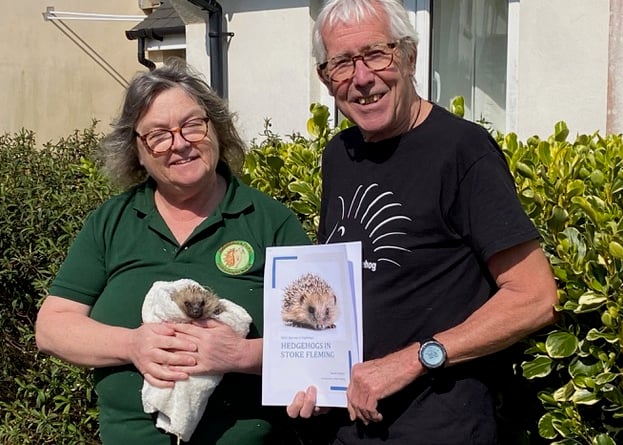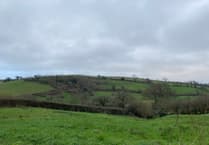A CAMPAIGN to protect hedgehogs is picking up speed in Stoke Fleming.
Following a survey and campaign by the Sustainability Stoke Fleming group the parish council has applied to Devon County Council Highways for signs at roadkill hotspots, to warn drivers to be aware of the threatened species. Hedgehogs are one of 11 mammals native to Britain now classified as at ‘imminent risk of extinction’.
Group member David Holmes is leading the Stoke Fleming campaign.
He said: “Based on our survey we’re requesting these signs from highways be placed at critical points in Stoke Fleming - but, if the experience from other areas is anything to go by, we’re likely to have a difficult task on our hands. We’ve had unhelpful comments such as ‘we can’t tell animals where to go’ for example.
“The vast majority of requests for these signs, throughout the country, have been denied. We need to protect our threatened hedgehog population.
“We want to make Stoke Fleming a properly ‘hedgehog friendly’ village - the signs will help slow traffic through the village and protect people as well as hedgehogs and other mammals.”
Stoke Fleming Parish Council has applied to Devon County Council Highways for signs at the main roadkill hotspots around the village - along the A379, on Venn Lane on the outskirts of the village and on Embridge Hill.
David Holmes, leading the campaign with the Sustainability Stoke Fleming group, said initial response from Highways has not been good.
He said: “We’ve had comments such as ‘we can’t tell animals where to go’ when the signs are for the drivers not the hedgehogs! This is common with many other highways bodies and entirely misses the point about protecting endangered species. In fact, very few of these signs have been put up anywhere in the country.
“Hedgehogs are now a threatened species, having declined from a population of 50 million in the 1950s to only a million or so now. They are amongst the 11 mammals native to Britain that are classified as in imminent risk of extinction.”
The Department of Transport introduced the new traffic sign in 2019 for areas that had a healthy population of threatened mammals to warn drivers - to protect the drivers from accidents caused by avoiding the mammals and to protect the mammals such as hedgehogs themselves.
David added: “Although the signs are mainly to protect motorists from accidents while avoiding mammals, there’s a stated intention that the road sign is ‘also designed to reverse the decline in wildlife numbers, in particular hedgehogs whose population in rural areas has halved since 2000’.
“The request for hedgehog signs has been sent to the Chief Officer for Highways, Infrastructure Development and Waste, at Devon County Council, and we’re awaiting a decision.”
In Stoke Fleming Parish Council’s February meeting minutes it was stated a highways officer was “unhelpful” over other suggested signs elsewhere in the village. On the issue of the hedgehog warning signs the minutes stated: “The same officer did not see the point of installing signs at certain points to advise drivers to be on the lookout for hedgehogs on the road, on the grounds that they ‘wander where they will’. It will be pointed out that the type of sign in mind, which is a recognised one, is to inform drivers rather than hedgehogs.”
A spokesman for Devon County Council said this week: “New road signs warning the public of small mammals, such as hedgehogs, can only be authorised by the Department of Transport. We have received correspondence from Stoke Fleming Parish Council on this matter and Devon County Council is looking at any applications. We will respond in due course.”
David Holmes conducted the detailed survey of hedgehog sightings in Stoke Fleming with Judy Oliphant, who runs a hedgehog hospital, Prickles in a Pickle, in the village. Judy now handles around 1400 to 1500 hedgehogs a year from across the South West. David said she releases them back to their locations when able to and about 50 get released in Stoke Fleming every year, boosting the native population.
The hedgehog survey was completed by 61 Stoke Fleming residents. Of those who responded 84 per cent said they had sighted a hedgehog in the last 12 months. Sixty-nine per cent of respondents said they had seen hedgehogs in their own gardens, many on a weekly or even daily basis. Most of the respondents – 84 per cent – said they were actively helping the hedgehog population with wild areas to encourage wildlife, putting out water. Half of the respondents said they had a hole in their fence to enable hedgehog travel and 43 per cent have a hedgehog house in their gardens.
David said: “One of the objectives of the survey was to demonstrate that we have a good population of hedgehogs that needs protection. Because we have a relatively healthy hedgehog population within a dramatically declining population country-wide we want to do all we can to protect them.”




